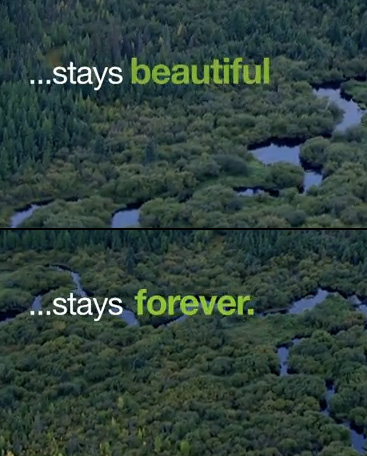Greenpeace pulls out of Canadian Boreal Forest Agreement
Greenpeace pulls out of Canadian Boreal Forest Agreement

It's not just a rumour anymore. Greenpeace has, as of today, pulled out of the Canadian Boreal Forest Agreement.
The Canadian Boreal Forest Agreeement (CBFA) was announced two and a half years ago with some pretty heavy rhetoric. Greenpeace's dramatic video, which you can still watch, used the following language:
Seven years of campaigning has led us to May 18, 2010. The biggest forest conservation agreement on earth. Ever.
Greenpeace, 8 other environmental organizations, and 12 of Canada's largest logging companies will make sure all THIS...
[images of moose, fawns, birds being fed by their mother in a nest]
... stays beautiful, stays vital, stays protected, stays forever
Leaving aside "forever" for the moment, the agreement never actually protected anything for more than two years, and did not at any point reduce the rate of logging in the Boreal forest. What it did do is temporarily move some logging (an area about the size of Toronto) outside of woodland caribou habitat, and establish "world-leading practices" for the existing logging. In return, the environmental groups agreed to remove all criticism of the logging company signatories from their web sites, and in a variety of cases help companies to market their products as environmentally friendly.
Media coverage at the time reflected the rhetoric, not the reality, repeating claims that "an area twice the size of Germany" was being protected, or that the boreal forest had been "saved".
No one knew better, because the actual details of the agreement were secret. That changed when the Vancouver Media Co-op leaked a copy, along with audio recordings of internal debates within Greenpeace. Dawn Paley analyzed the contents in what remains the single best reference article on the subject. Subsequent reactions and attempts to bring First Nations onboard after the fact reflected decidedly mixed reviews despite the PR onslaught.
None of these are the reason that Greenpeace pulled out of the agreement.
They pulled out because above and beyond the fact that the agreement didn't actually change the rate of cutting, companies like Resolute Forest Products were not willing to operate within the parameters of the agreement.
The undemocratic two-stage model of environmental campaigning, which Greenpeace's CBFA video is actually a very effective illustration of, is very much in tact. The first stage is a campaign conducted by volunteers who get arrested in direct actions, employees who make banners and raise money, and by allied groups who share an enemy in the logging companies.
The second stage cashes in the political capital raised by those folks, and directs it into a secret agreement like the CBFA or the Great Bear Rainforest Agreement.
Typically, the second phase happens without the consultation or consent of any of the people who are affected, or who actually did the work. Those who were mobilized are demobilized, as the organization makes an about-face. As one might expect, only deeply hierarchical organizations like Greenpeace can effect these kinds of 180-degree turns. An organization where members had control wouldn't put up with it unless they were convinced that the decision was for the best, which would necessitate access to the text of the agreement. Greenpeace has now effected a second about-face, and are campaigning against Resolute, remobilizing the volunteers they had demobilized.
The positive aspect of this development is that First Nations and environmental organizations that want to actually stop destructive logging in the boreal forest no longer have Greenpeace as an opponent, at least not formally, for now.
Barriere Lake, for example, has been fighting Resolute over illegal logging for months, but have not received any support from Greenpeace. Grassy Narrows had been supported by Greenpeace before the CBFA was signed. When Grassy Narrows leaders called for a boycott of CBFA signatory Weyerhauser, after the signing, Greenpeace avoided any mention of Weyerhauser in its tepid support for the community, and placed a pop-up on sections of its web site that criticized Weyerhauser, declaring that the CBFA had changed things.
Hopefully Greenpeace will make its considerable resources and publicity accumen available to those who have been struggling against logging companies for decades. Until Greenpeace's top-down structure and penchant for secret deals is replaced with democracy and transparency, these allies will do well to maintain caution when working with the world-famous NGO.

